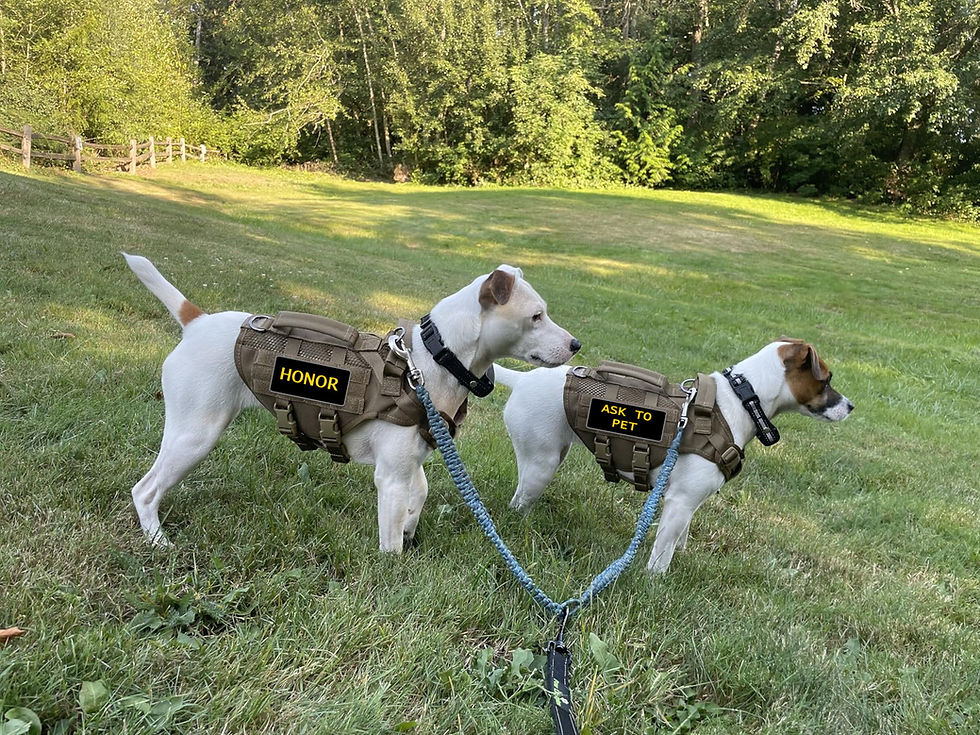Wildfire Smoke & Pets: Risks, Tips, and When to Act
- Mar 26, 2025
- 4 min read

While we often focus on human safety, it's crucial to remember that our pets are also at risk. Smoke and ash from wildfires can have life-changing effects on animals. Let's explore some questions about how wildfires affect pets and what you can do to keep them safe.
Does wildfire smoke and ash affect my pet?
Absolutely. If you're feeling the effects of smoke, your pets likely are, too. Smoke can irritate their eyes and respiratory system, leading to discomfort and health issues. Ash may still be hot, cause burns, and set fire to the coats of breeds with longer coats.
How long can dogs and cats get sick from smoke or ash inhalation?
The duration of illness depends on the severity of exposure. Some pets might recover quickly once they're no longer exposed. In contrast, others, especially those with pre-existing conditions, might experience prolonged symptoms. Consult your vet if you notice any signs of distress. See what to watch out for below.
Is it bad for my cat or dog to breathe in smoke or ash?
Yes, inhaling smoke or ash is harmful to pets. Smoke inhalation can lead to respiratory issues, eye irritation, and other health problems. Pets with heart or lung diseases are particularly vulnerable.
What are the immediate signs of smoke and ash inhalation?
Coughing or gagging
Red or watery eyes
Difficulty breathing
Fatigue or weakness
Reduced appetite
Disorientation
Regardless of the circumstance, contact your veterinarian promptly if your pet shows any of these symptoms.
How do I reduce my pet's smoke and ash exposure?
Keep pets indoors: Close all windows and doors to minimize smoke infiltration.
Limit outdoor activities: When air quality is poor, only allow your pet brief bathroom breaks. Keep outdoor activities to a minimum, so it's best to skip extended walks and runs. If you must go out and are in a particularly bad zone, carry a damp towel ready to extinguish any embers that come in contact with your pets.
Use air purifiers: These can help reduce indoor smoke particles.
Create a safe space: Set up a room with minimal windows and use damp towels to prevent smoke from entering.
Are certain dogs or cats more at risk than others?
Yes, some pets are more vulnerable to wildfire smoke and ash. Pets with existing heart or lung conditions, young or senior animals, and certain breeds are at higher risk.
Short-nosed (brachycephalic) dog breeds like Bulldogs, Pugs, Boxers, Shih Tzus, and Boston Terriers have shorter nasal passages, making it harder for them to filter out smoke particles and breathe properly.
Short-nosed cat breeds like Persians and Himalayas are similarly affected.
Smaller dogs, like Chihuahuas, Yorkshire Terriers, and Toy Poodles, have smaller airways that can become inflamed more quickly.
Pets with pre-existing conditions, like asthma, bronchitis, a history of tracheal collapse, or heart disease, may experience severe respiratory distress even with low smoke exposure.
If you have a pet in any of these categories, minimize their exposure to wildfire smoke by keeping them indoors, using air purifiers, and watching for signs of respiratory distress.
What should I do if there is a wildfire in my area?
Stay informed: Monitor local news, get a link to a wildfire map, and follow evacuation orders.
Prepare an emergency kit: Include food, water, medications, and comfort items for your pet.
Plan evacuation routes: Know where you'll go and ensure the place is pet-friendly.
How do I check the air quality in my area?
Monitor air quality indexes using online resources like the Environmental Protection Agency's AirNow website or local news outlets.
What should I take for my dog or cat if I have to evacuate?
Food and water: At least a week's supply.
Medications: Get digital copies of any prescriptions and medical records.
Comfort items: Bring along their favorite toys and bedding.
Identification: Make sure your dog and cat have ID tags, and consider microchipping.
For a more comprehensive list for your dog, see our article, Emergency Preparedness: Your DIY Dog Bugout Bag.
Where can I learn more about wildfires?
The Centers for Disease Control and Prevention (CDC) offers comprehensive wildfire preparedness and safety resources.
How does poor air quality or wildfire smoke impact my pet's health?
Beyond respiratory issues, prolonged exposure can lead to heart problems and decreased stamina. Monitor your pet's behavior and consult a vet if you have concerns.
How should I minimize my dogs, cats, and birds' exposure to poor air quality?
Keep them indoors: Especially during peak smoke times.
Seal your home: Close windows and use damp towels to block drafts.
Use air conditioning: Set it to recirculate indoor air when traveling in a vehicle.
How can I keep my dog and cat entertained while staying indoors?
Interactive toys: Puzzle feeders or treat-dispensing toys can keep them engaged.
Training sessions and indoor play: Teach new tricks or reinforce old ones. Create an obstacle course or play a simple game of fetch.
Can my dog or cat wear a face mask of some kind?
It's not recommended. Masks aren't designed to fit animals properly, there is little research covering the pros and cons, and lastly, they might cause more stress or breathing difficulties. Focus on minimizing exposure instead. Remember, if the air quality affects you, it also affects your pets. Taking proactive steps can ensure their safety and well-being during wildfire season.
How My Pet Vet Mobile Can Help
At My Pet's Vet Mobile, we provide personalized, in-home veterinary care to help your pet stay healthy during wildfire season. Whether it’s a wellness exam, urgent care, or guidance on air quality safety, we’re here for you. Your pet’s health is our priority—stay safe and prepared!
If you’re concerned about your pet’s health, book an appointment today!
📅 Book online: mypetsvetmobile.com/appointments
📞 Call us: +1 864-206-5315









Comments